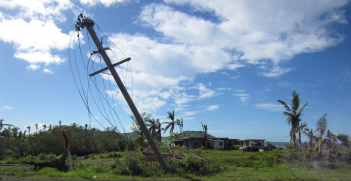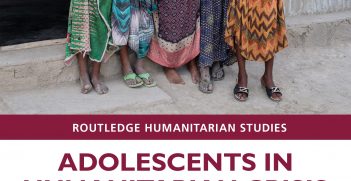Island Kingdom’s Communication Cable Repaired

After more than five weeks, the sole communication cable for Tonga has been repaired. For members of the Tongan diaspora, the restoration of telephone calls and internet-based communication with people in Tonga has been a welcome relief.
On 15 January 2022, a volcanic eruption near the Pacific Island nation of Tonga damaged the country’s sole undersea communication cable. This meant that international telephone calls and internet traffic ceased, leaving members of the Tongan diaspora in Australia, New Zealand, and other countries unable to communicate with their loved ones in Tonga. On 22 February 2022, cable repair was completed and restoration of services commenced. In total, the international cable was out of service for five weeks and three days.
Natural Disaster
The Hunga-Tonga-Hunga Ha’apai underwater volcanic eruption triggered a tsunami that caused devastation on the most inhabited island of Tongatapu and surrounding islands. Four people lost their lives. The volcano caused major infrastructure damage on the islands of Ha’apai — including Fonoifua, Nomuka, Mango, Niniva — and ‘Ata’ataa. All 62 residents of Mango Island had to be relocated as their homes had been destroyed. The blast force of the volcanic eruption coated the islands in a thick layer of volcanic ash, damaging crops and contaminating drinking water. The Tongan government estimated that as many as 84 percent of residents had been affected by the ash and tsunami. In all, more than 2,000 people have been displaced.
Tongans in the Diaspora
Tongan people in the diaspora were distressed not having communication with their family members and friends back home for up to two weeks. Tongan communities in the diaspora united in solidarity through prayer for the safety of their families in Tonga. Many gathered resources and goods to send home including nonperishable items and bottled water. Some families who had access to a satellite telephone were lucky to make contact early on in the aftermath.
Tongans who were connected to a Digicel service were able to resume international calls five days after the volcano erupted. The other mobile operator in Tonga, UCall, restored international calls ten days after the eruption. Many members of the Tongan diaspora continued to have challenges reaching loved ones in Tonga. In an effort to assist, TPG Telecom, an Australian telecommunication company, offered customers in Australia free calls to Tonga for a fortnight.
The Tongan international border is currently closed. It is unknown when repatriation flights will be available for Tongan nationals, including seasonal workers, who wish to return home. Thus, having connection via social media, email, and video and audio calls is essential for members of the Tongan diaspora.
Cable Damage and Repair
SubCom, part of the United States-listed Swiss company TE Connectivity — formerly known as Tyco Electronics — holds a maintenance contract for Tonga’s cable. Its ship CS Reliance travelled from Papua New Guinea to Samoa to collect supplies before going to the site of the damage to commence repairs. When the ship arrived, it was discovered that the damage was worse than anticipated, and thus the repairs took longer than first estimated. In order to complete the repairs, damaged ends of the cable were pulled up to the ship’s deck and new cable was added.
Once the international cable was repaired, the maintenance crew turned its attention to a domestic cable connecting Tonga’s main island to other islands. It’s now estimated that the domestic cable could take months to repair. Roughly 110 kilometres of cable was destroyed or buried due to the volcanic eruption. That section of cable will need to be replaced, and it may be difficult to source such a long section of the right type of cable. Sourcing or manufacturing the required section and then completing the repair could take up to a year. In the interim, microwave and satellite links are providing connectivity to outer islands.
In 2019, Tonga had no internet service for about a fortnight when its undersea cable was inoperable due to damage. In the wake of that incident, the Tongan government sought to establish a backup system. It was announced that the geostationary satellite Kacific1 would provide the required redundancy. However, at the time of the volcanic eruption, a dispute between the Tongan government and the Kacific company was under arbitration in Singapore. After the eruption, Kacific offered to help, but nothing eventuated.
In the meantime, technology entrepreneur Elon Musk offered assistance to Tonga through his internet system Starlink, which utilises SpaceX’s low-earth orbit satellites. He has subsequently set up Starlink services in Tonga, with a donation of fifty internet terminals. Use will be free of charge until cable connectivity is restored to all islands.
Aid and COVID-19
Immediately after the eruption, it was unclear how much damage had been caused. Australian Prime Minister Scott Morrison, New Zealand Prime Minister Jacinda Ardern, and others described communication difficulties and a lack of information about the extent of the disaster. Australia and New Zealand sent aircraft to ascertain the damage and capture images. The extent of the damage became clearer as images emerged from these reconnaissance flights. The images helped to ascertain immediate needs and to commence planning for the necessary repair and restoration of essential services and infrastructure. Several countries, including Australia, have been providing aid in the weeks following the eruption.
Initially, Tonga was unable to use aircraft itself due to impacts such as ash covering airport runways. Once they were able to travel to the Ha’apai island group, nongovernment organisation MORDI Tonga Trust was able to share images of the extensive damage there. Another useful source of information for the Tongan diaspora in the weeks after the disaster was the National Emergency Management Office.
Until recently, there had been no community transmission of COVID-19 in Tonga. The only case detected in Tonga had been an arriving passenger late in 2021. Since the volcanic eruption, with aid coming in, there has been an outbreak of COVID-19 cases. There have now been 645 cases in total, of which 644 have occurred since the volcanic eruption.
With the rise in COVID-19 cases, the restoration of international connectivity has meant Tongans in the diaspora and the wider public have been able to stay informed about the status of COVID-19 in Tonga. Donors and others can be better informed regarding the essential resources and services required. Ease of communication can assist with the overseas aid and funding that is being provided to help the nation with disaster recovery efforts and the pandemic. International connectivity has allowed the diaspora to be updated with the health and wellbeing of their families back home. Tongan community members in the diaspora and seasonal workers in Australia and New Zealand are comforted knowing their family and friends in Tonga are only a telephone call away.
Dr Amanda H A Watson is a Research Fellow with the Department of Pacific Affairs at Australian National University. Her research focuses on telecommunications in the Pacific region. Dr Watson follows regulatory issues and monitors mobile internet prices and speeds. Her PhD thesis looked at the uptake and use of mobile telephones during the earliest days of mobile telephone adoption in Papua New Guinea.
Dr Gemma Melvena Malungahu is a Tongan Research Fellow with the Department of Pacific Affairs at Australian National University. She completed her PhD in 2020 at the University of Auckland. Her PhD research explored the experiences and perspectives of Tongan families with rheumatic fever in South Auckland with regard to housing and housing policy. Her research interests include Pacific health, Tongan peoples in the diaspora, migration, public health, equity and access to health care.
This article is published under a Creative Commons License and may be republished with attribution.





